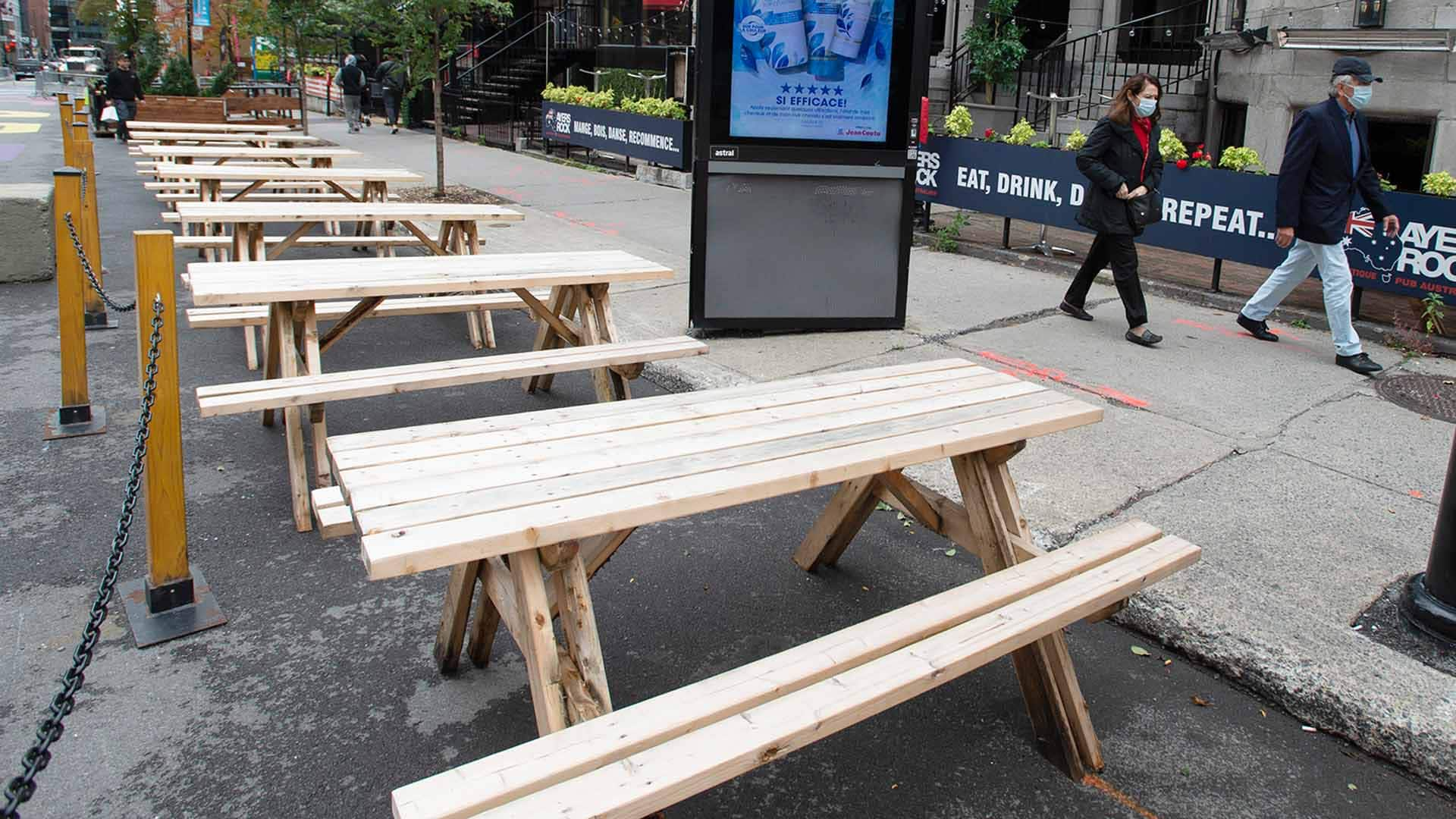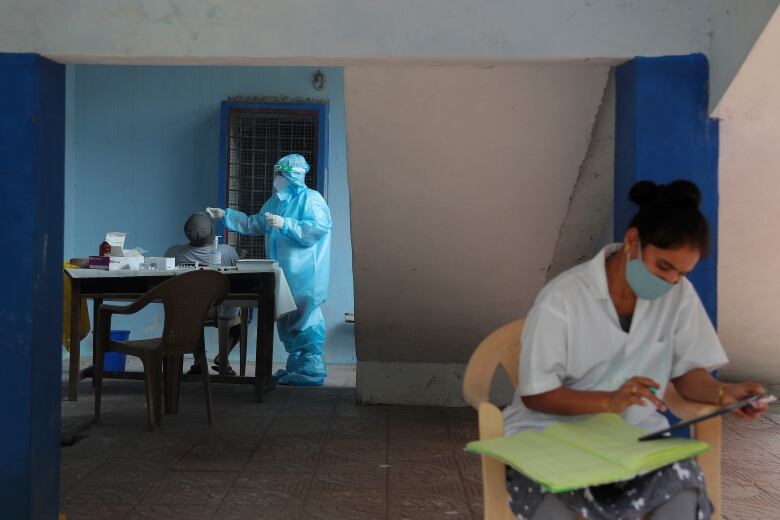Coronavirus: What’s happening in Canada and around the world on Saturday
The latest:
- Quebec considering more restrictions in red zones as new cases total 1,107.
- COVID-19 cases may slow clearing of elective surgery backlog in some provinces, top health official warns.
- Masks could become mandatory in New Brunswick.
- U.S. President Donald Trump fever-free and breathing well in hospital, doctor says.
- India’s coronavirus death toll surpasses 100,000.
- Mexico’s total of confirmed cases rises to 753,090.
Quebec and Ontario have reported rising daily COVID-19 case counts. Quebec saw more than 1,000 new infections on Friday, while Ontario hit a single-day record with 732.
The daily count of new cases in Ontario was 653 on Saturday, according to a tweet from Health Minister Christine Elliott. Meanwhile, Quebec added 1,107 new cases on Saturday.
Ontario Premier Doug Ford has introduced measures to limit restaurant capacity in Ottawa and Peel Region to 100 patrons, while Toronto Public Health capped numbers in Toronto to 75. Tables will be limited to no more than six people.
WATCH | Premier Doug Ford introduces further restrictions across Ontario:

Though focused primarily on Ottawa, Toronto and Peel Region, Ontario Premier Doug Ford unveiled new public health measures for the province to stop the spread of the coronavirus. 3:57
The province is moving to restrict COVID-19 testing to appointment only starting Tuesday. It has also ordered masks for all public indoor spaces and told residents to restrict interactions to their immediate household — even if it means curtailing Thanksgiving plans.
Meanwhile, people in Quebec entered the weekend under a partial lockdown that practically bans all parties and socializing.

Premier François Legault earlier this week ordered a 28-day lockdown in the province’s so-called red zones — which include Montreal and Quebec City — to limit the spread of COVID-19, and he has enlisted police in enforcing public health rules that can impose $1,000 fines on those who don’t comply.
Some Montreal restaurateurs have complained of being treated unfairly by the lockdown, saying there have been no COVID-19 outbreaks tied to the city’s famed restaurant industry. Nevertheless, officials have temporarily banned private indoor gatherings and shut bars, cinemas and restaurant dining rooms.
WATCH | Quebec’s red zones shut down to slow COVID-19 spread:

Red zone restrictions are in effect in three Quebec areas, including Montreal and Quebec City, meaning bars are closed and restaurants no longer have indoor dining for the next 28 days as the province tries to manage a spike of COVID-19 cases. 2:01
Legault described the situation Friday as “critical” and suggested more restrictions could be imposed on Monday, when new rules are expected for sporting activities and gyms.
According to a working public health document obtained by Radio-Canada, no team sports or contact sports will be allowed in red zones.
The growing number of COVID-19 cases in Ontario and Quebec comes with the risk of hospitals becoming overwhelmed as they work to clear a backlog of surgeries, delayed because of the pandemic, says Canada’s Chief Public Health Officer Dr. Theresa Tam.
She said that over the past week, there have been an average of 500 COVID-19 patients in hospitals across Canada on any given day and warned this is putting a new strain on the health-care system.
“Since reopening, hospitals have been working to catch up with a backlog of important elective procedures, but as COVID-19 infection rates increase and hospitalizations increase, they may be faced with the difficult decision of delaying further,” Tam said on Friday.
New Brunswick added one new case of the infection on Saturday for a total of 201 cases. The province has six active cases.
Masks may soon be mandatory in the province as early as Oct. 8, according to Premier Blaine Higgs.
“We’re going to lead up to it, we’re kind of building into it, working with the communities, working with the businesses, staging people to become more diligent and get into that program,” he said.
He reminded residents that wearing a face mask in public when physical distancing is not possible is mandatory under the province’s state of emergency order, and if New Brunswickers do not comply, a mandatory mask policy “could be implemented.”
What’s happening in the rest of Canada
As of 2:05 p.m. ET on Saturday, Canada had 164,456 confirmed or presumptive coronavirus cases. Provinces and territories listed 138,854 of those as recovered or resolved. A CBC News tally of deaths based on provincial reports, regional health information and CBC’s reporting stood at 9,461.
WATCH | Prime Minister Justin Trudeau announces $600M to help businesses:

The Federal Government pledges to invest $600 million to help businesses and workers through the RRRF program during a briefing. 0:37
In Manitoba, officials have offered tips for a safe Halloween amid COVID-19, suggesting distancing tricks could include using tongs to distribute candy at the door.
Manitoba added 38 new cases on Saturday for a total of 2,108 cases, as well as another COVID-19 death, bringing its total number of fatalities linked to the respiratory illness to 22.
Nova Scotia has reported three active cases of COVID-19. The province said on Friday that it identified one new travel-related case. Nova Scotia is also renewing its state of emergency, which will take effect at noon on Sunday and run until noon on Oct. 18.
Meanwhile, travel within the Atlantic bubble will get easier on Oct. 8., when travellers will no longer be screened by New Brunswick officials at the Prince Edward Island and Nova Scotia borders, Higgs said.
Instead, some of those officials will be redeployed to the borders with Quebec and the United States, while others will keep an eye on gatherings and mask use.
The region’s success in keeping its numbers low has been hard won. Tourism has taken a massive hit, even with quarantine-free travel permitted within the bubble. Last week, the Atlantic Canada Airports Association said air travel in the region was down 92 per cent from April to the end of August compared with the same period last year.
Residents of Ottawa‘s West End Villa and their families have launched a $16-million class-action lawsuit against Extendicare, the owner of the long-term care home where 19 people have died in a COVID-19 outbreak.
The claim alleges Extendicare was negligent and breached the basic human rights of the home’s residents.
What’s happening around the world
According to the ongoing tally by Johns Hopkins University in Baltimore, the global total of confirmed coronavirus cases stands at more than 34.7 million. More than one million people have died, while more than 24 million have recovered.

In Europe, infections in the Czech Republic have been on a steep rise, setting a new record high for the second straight day.
The country’s Health Ministry says the day-to-day increase in new confirmed COVID-19 cases was 3,793 on Friday, 300 more than the previous day.
In Asia, India has reached 100,000 confirmed coronavirus deaths, trailing only the United States and Brazil.
The Health Ministry says the 79,476 new infections raised the overall confirmed caseload to more than 6.4 million. The country’s toll is nearly 10 per cent of the global deaths.

In Africa, South Africa has reopened to international flights, ending a more than six-month ban on international travel that was part of its restrictions.
The country has passed its first peak of the disease, experts said, and has reported 674,000 confirmed cases, including 16,734 deaths, according to the Africa Centers for Disease Control and Prevention. South Africa has nearly half of the total of 1.4 million cases reported by Africa’s 54 countries.
In the Americas, U.S. President Donald Trump’s doctors say the president is doing well, is fever-free and isn’t having difficulty breathing after contracting the coronavirus.
Dr. Sean Conley, Trump’s physician, said while the president had fatigue, nasal congestion and coughing, his symptoms are resolving and improving. Trump had not been on oxygen Saturday or when he was with the medical team Friday, Conley said.
Meanwhile, U.S. Sen. Rick Scott said he misspoke on Saturday when he said on national television that he had tested positive for COVID-19.
The Republican from Florida tweeted: “I misspoke this morning in my FoxNews interview. I was tested yesterday for COVID and tested NEGATIVE.”
During an interview Saturday morning on Cavuto Live, when asked about three Senate colleagues who had contracted the virus in recent days, Scott said, “I was tested yesterday, I think for the sixth time, and I tested positive again.”
A short time later, Scott’s spokesperson, Chris Hartline, tweeted, “For everyone calling and texting right now, Sen. Scott misspoke on tv this morning. He tested negative for COVID yesterday.”



